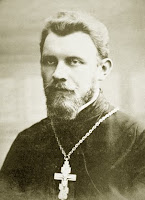BLESSED VASYL VELYCHOCSKY was born in 1903 into a priestly family in Western Ukraine . His father was a priest, as were both his grandfathers. After serving as a rifleman in the First World War, Vasyl entered the Major Seminary in Lviv , Ukraine
During this period, the region was under Polish control and there was strong pressure for the Ukrainian Greek Catholic Church to become polonized. Father Vasyl refused to do this. Instead, he strived to unite the faithful under Metropolitan Andrey Sheptytsky. Because of this, he was forced to leave Volyn in 1935. He returned to Stanislaviv where he spent the next several years giving traditional Redemptorist two-week-long missions. In June 1940, with the Soviets occupying Western Ukraine , Father Vasyl led a procession of some 20,000 people through the streets of Stanislaviv on the occasion of the feast of Our Mother of Perpetual Help.
In 1942 he became abbot of the monastery in Ternopil. Because of religious persecution by the Soviet Government he was arrested in 1945 by the NKVD and sent to Kyiv. The punishment of death was commuted to 10 years of hard labor. He was given the opportunity to join the Russian Orthodox Church and be released. Father Vasyl refused. With an authoritative voice he replied: “No, never! Under any circumstances . . . I have said NO once and for all; and you can shoot me, and kill me, but you shall get from me no other word.”
 Over the next 10 months Father Vasyl was tortured until he confessed to crimes he never committed. He was interrogated 11 times. Usually these were conducted at night and lasted up to 12 hours. Sleeplessness, isolation, food deprivation, physical and moral abuse helped to breakdown his willpower until he finally confessed to anti-Soviet activity.
Over the next 10 months Father Vasyl was tortured until he confessed to crimes he never committed. He was interrogated 11 times. Usually these were conducted at night and lasted up to 12 hours. Sleeplessness, isolation, food deprivation, physical and moral abuse helped to breakdown his willpower until he finally confessed to anti-Soviet activity.His trial was held on June 26, 1946. Without representation or witnesses, he was quickly found guilty and sentenced to execution by firing squad. He spent the next three months on death row, but even there preached, heard confessions and help prepare fellow prisoners for death. One day his name was called. He left his cell ready to give up his life for his beliefs. However, his sentence was changed to 10 years of hard labour in the Soviet laager camps, working under the worst possible conditions. During this time Father Vasyl heard confessions, preached and even celebrated the divine liturgy daily, using a large tablespoon as his chalice and wine made from raisins.
On release in 1955 he went back to Lviv, and was secretly ordained in 1963. In 1969 he was imprisoned again for three years for his religious activities. Released in 1972, he was exiled. Stricken with a heart disease stemming from his imprisonment, the metropolitan told a Canadian audience, "The prisons and camps ruined my health and my strength, but this was my fate; the Lord God placed this cross on my shoulders."
He died two weeks later in Winnipeg
Thirty years after his death, Vasyl Velychkovsky's body was found to almost incorrupt. On June 27, 2001, Bishop Vasyl was beatified by Saint Pope John Paul II in a ceremony in Lviv. Then, in September 2002, Bishop Vasyl’s body was transferred to a shrine built in St. Joseph ’s Ukrainian Catholic Church in Winnipeg
Today, the Blessed Vasyl Velychkovsky Shrine is visited by thousands of pilgrims annually, with many denominations represented. His story is a source of inspiration and his relics have become a source of healing. Moreover, in no small measure, Bishop Vasyl’s faith, enthusiasm and courage ensured the life of the Ukrainian Catholic Church in her homeland during a time of fierce persecution.
 |
| With Ukranian Redemptorist Martyrs (Nicholas, Zenon, Ivan) |

